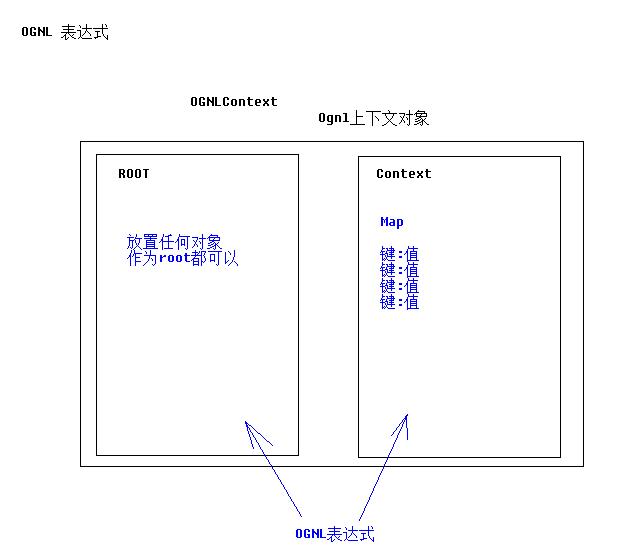Struts——OGNL表达式与Struts2结合
Posted 想54256
tags:
篇首语:本文由小常识网(cha138.com)小编为大家整理,主要介绍了Struts——OGNL表达式与Struts2结合相关的知识,希望对你有一定的参考价值。
一、OGNL表达式
OGNL:对象视图导航语言. ${user.addr.name} 这种写法就叫对象视图导航.
OGNL不仅仅可以视图导航而且还支持比EL表达式更加丰富的功能.

语法:
public void func() throws OgnlException {
// 1.准备Root
User rootUser = new User("jiaxin",23);
// 2.准备Context
Map<String,User> context = new HashMap<String,User>();
context.put("user1",new User("计震宇",22));
context.put("user2",new User("baoyan",25));
// 3.实例化OnglContext
OgnlContext oc = new OgnlContext();
// 4.设置进OnglContext中
oc.setRoot(rootUser);
oc.setValues(context);
// ***************从root中取值***************
String name = (String) Ognl.getValue("name", oc, oc.getRoot());
Integer age = (Integer) Ognl.getValue("age", oc, oc.getRoot());
System.out.println("name:"+name+"\\tage:"+age);
// ***************从context中取值***************
String name1 = (String) Ognl.getValue("#user1.name", oc, oc.getRoot());
Integer age1 = (Integer) Ognl.getValue("#user1.age", oc, oc.getRoot());
System.out.println("name:"+name1+"\\tage:"+age1);
// ***************赋值****************
Ognl.getValue("name=\'计宝宝\'", oc, oc.getRoot());
String name2 = (String) Ognl.getValue("name", oc, oc.getRoot());
// 先改值再取值
String name3 = (String) Ognl.getValue("#user1.name=\'计宝宝\',#user1.name", oc, oc.getRoot());
System.out.println(name2+"\\t"+name3);
// *****************调普通方法****************
String name4 = (String) Ognl.getValue("setName(\'计震宇\'),getName()", oc, oc.getRoot());
String name5 = (String) Ognl.getValue("#user2.setName=\'张军\',#user2.getName()", oc, oc.getRoot());
System.out.println(name4+"\\t"+name5);
// *****************调用静态方法*****************
Double PI = (Double) Ognl.getValue("@java.lang.Math@PI",oc,oc.getRoot());
Double PI2 = (Double) Ognl.getValue("@@PI",oc,oc.getRoot());
System.out.println(PI);
// ******************创建List,Map对象****************
Integer len = (Integer) Ognl.getValue("{\'ji\',\'zhen\',\'yu\',\'bao\'}.size()", oc, oc.getRoot());
String value = (String) Ognl.getValue("{\'ji\',\'zhen\',\'yu\',\'bao\'}.get(0)", oc, oc.getRoot());
String value2 = (String) Ognl.getValue("{\'ji\',\'zhen\',\'yu\',\'bao\'}[2]", oc, oc.getRoot());
System.out.println(len+"\\t"+value+"\\t"+value2);
// 字典前面要加“#”,注意和取context中的内个“#”没有任何关系
Integer len2 = (Integer) Ognl.getValue("#{\'k1\':\'v1\',\'k2\':\'v2\'}.size()",oc,oc.getRoot());
String value3 = (String) Ognl.getValue("#{\'k1\':\'v1\',\'k2\':\'v2\'}[\'k1\']",oc,oc.getRoot());
String value4 = (String) Ognl.getValue("#{\'k1\':\'v1\',\'k2\':\'v2\'}[\'k2\']",oc,oc.getRoot());
System.out.println(len2+"\\t"+value3+"\\t"+value4);
}
二、OGNL表达式与Struts2结合

1、三种接收参数的原理



2、获取参数

3、查找顺序

以上是关于Struts——OGNL表达式与Struts2结合的主要内容,如果未能解决你的问题,请参考以下文章